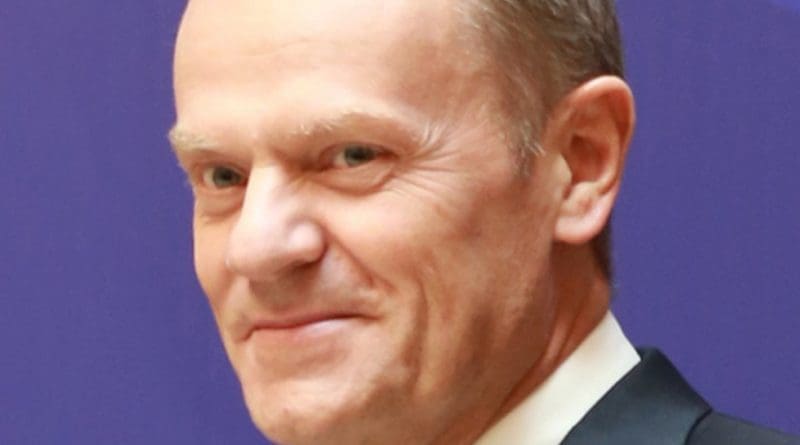Tusk Tells EU Leaders Only Pride And Unity Can Prevent Disintegration
By EurActiv
By Daniela Vincenti
(EurActiv) — In an emotional letter sent to EU leaders gathering in Malta this week, European Council President Donald Tusk issued a bold call to arms Tuesday, to fight those who try to whittle away at the European project, loudly and clearly asserting that the EU is here to stay.
“In a world full of tension and confrontation, what is needed is courage, determination and political solidarity of Europeans. Without them we will not survive,” he said, giving EU leaders the proper ammunition to counterattack US President Donald Trump and like-minded world leaders hostile to the Union.
Tusk sent the letter to the 27 heads of state and government expected to meet in the baroque courtyards of the Grandmaster’s Palace in Valletta on Friday (3 February). EU leaders will meet without British Prime Minister Theresa May, as they are preparing to forge a new vision for the bloc rocked by divisive crises, including Brexit.
Recent verbal attacks by US President Donald Trump might have created the right sense of urgency to declare a united front. Meddling in EU affairs, Trump said that after the UK, other countries would leave the bloc. The billionaire-turned president called NATO obsolete, criticised Angela Merkel’s asylum policy, and characterised Brexit as “great”.
Tusk did not hide his concern about the new US government and its differences with the last seven decades of American foreign policy. But the opportunity is self-evident.
EU disintegration is no sovereignty restoration
“It must be made crystal clear that the disintegration of the European Union will not lead to the restoration of some mythical, full sovereignty of its member states, but to their real and factual dependence on the great superpowers: the United States, Russia and China,” Tusk wrote to EU leaders.
“Only together can we be fully independent,” he said.
This is the second time that EU leaders are meeting to discuss a new course for the 27-country bloc and launch a new roadmap on the anniversary of the Treaty of Rome next March. They previously met four months ago in Bratislava but, what was largely anticipated as a show of unity, ended with them refusing to share a stage together, in open disagreement over immigration and the economy.
Acknowledging that the challenges currently facing Europe are more dangerous than ever, Tusk warned against an assertive China, Russia’s aggressive policy and the changes in Washington, putting the EU in a difficult situation.
“For the first time in our history, in an increasingly multipolar external world, so many are becoming openly anti-European, or Eurosceptic at best,” he writes, adding that the external threat is mirrored internally by the rise in anti-EU, nationalist, xenophobic sentiment.
In other words, attacking the ideology and institutions has become more important than defending the interests and emotions of the people, he reckons.
To counterattack national egoism, which Tusk says is becoming an attractive alternative to integration, the European Council president believes that pride and dignity are adequate weapons.
“In Rome, we should renew this declaration of faith,” he writes. “If we do not believe in ourselves, in the deeper purpose of integration, why should anyone else?”
“If we pretend we cannot hear the words and we do not notice the decisions aimed against the EU and our future, people will stop treating Europe as their wider homeland,” Tusk insisted, raising the stakes and opting for political incorrectness to oppose the rhetoric of demagogues who claim that EU integration is beneficial only to elites.
Emotional intelligence
Tusk was not shy in calling EU leaders to stand up very clearly for dignity, the dignity of a united Europe.
“In Rome, we should strongly reiterate these two basic, yet forgotten, truths: firstly, we have united in order to avoid another historic catastrophe, and secondly, that the times of European unity have been the best times in all of Europe’s centuries-long history,” he writes.
The Polish ex-premier was not shy about demanding assertive, albeit spectacular steps that would change inspire and revive aspirations to take European integration to the next level.
The list of demonstrative actions recalls the letter Tusk sent before the Bratislava summit in September, in which he stressed the need to restore a sense of external and internal security as well as socio-economic welfare for European citizens.
Moving ahead, though, cannot be done without looking back. In a veiled attack on Trump, Tusk reminds him of the US motto united we stand, divided we fall. But it is a clear reminder to his EU pals who might be lured by similarly divisive thoughts.
“Let us have the courage to be proud of our own achievements, which have made our continent the best place on Earth,” he writes in the letter.

